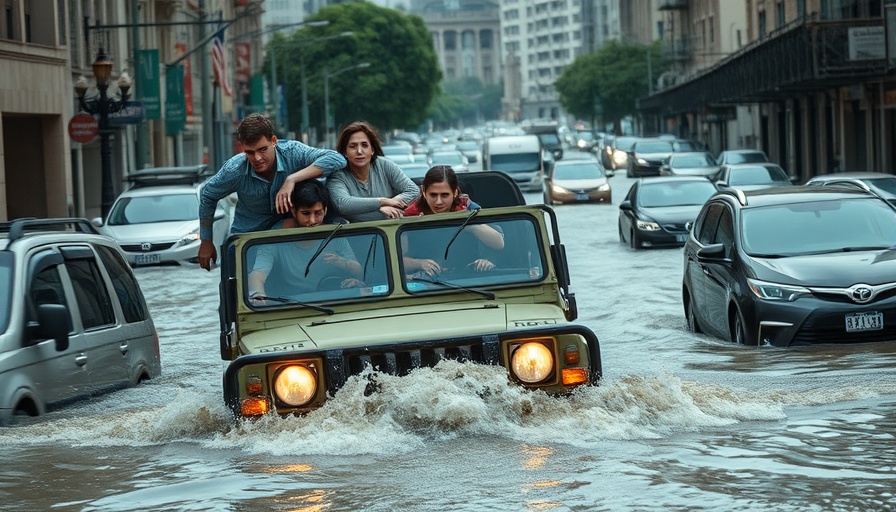
Reflections on Hurricane Katrina: A Legacy of Loss and Resilience
As the 20th anniversary of Hurricane Katrina approaches, Louisianans from every corner of the state are taking a moment to reflect on the profound impact of this catastrophic event. Transitioning from the chaos and destruction that marked the storm’s landfall on August 29, 2005, to the resilience and recovery that followed, the narrative is one of personal stories filled with loss, bravery, and hope.
Every Story Matters: Lives Changed Forever
In the days following Katrina, countless lives were altered as families were torn apart and communities devastated. For the older generations, the impact was particularly severe. Many had spent decades building lives in their homes, only to see them washed away within hours. The experiences of seniors during and after the storm highlight not only the immediate dangers posed by natural disasters but also the long-lasting struggles in recovery, such as housing instability and health access—issues that Linda Thompson, a local reporter, has long championed in her work.
Consider the story of Marjorie, an 82-year-old who lived in the Ninth Ward. 2005 marked a brutal chapter when she not only faced the loss of her home but also the death of her husband in the aftermath. Marjorie's journey since then encapsulates the strength of human spirit. Her new home, provided through city recovery programs, is a testament to resilience; yet the echoes of loss linger, reminding us that recovery is often a slow and painful process, particularly for those who are older and less mobile.
A Tapestry of Heroism: Acts of Kindness
Amid the chaos, stories of heroism have emerged that encapsulate the very best of humanity. Local volunteers and first responders risked their lives, and continue to be celebrated for their courage and selflessness. We see how neighbor helped neighbor, providing shelter and food during the height of the crisis. Their actions remind us that even in our darkest hours, a sense of community and togetherness can shine brightly.
For many seniors, such acts of kindness offer an antidote to despair. Bill, a retired firefighter in Baton Rouge, synthesized this idea exceptionally well when he said, “Katrina taught us that we are never alone. There are hands to hold you up.” These sentiments resonate strongly within the senior community, as they reflect on shared hardships and collective triumphs.
Lessons Learned: Current Challenges Facing Seniors
The aftermath of Katrina compelled community leaders and policy-makers to reassess disaster preparedness, particularly for vulnerable populations such as the elderly. Numerous programs have been implemented to ensure that seniors receive proper attention and resources during emergencies. Yet the struggle persists, as many older individuals remain isolated and at risk during crises. The COVID-19 pandemic has underscored these ongoing vulnerabilities.
In amplifying the voices of seniors, it’s essential to incorporate their needs into city planning and disaster recovery frameworks. Enhanced communication, transportation options, and specialized services can go a long way in securing a safer environment for all members of the community.
Looking Ahead: Future of Resilience in Louisiana
As residents mark this 20th anniversary, it’s essential to cultivate a forward-thinking mindset. We must not only remember the devastation but also celebrate the recovery efforts that emerged from it. It is crucial to empower our older adults with information on resources available to them, particularly in times of need.
Intriguingly, forecasts indicate that climate change does pose a threat to the region's future. Understanding these implications can empower communities to proactively adapt and prepare. The reliance on natural ties and community bonds can ensure that our beloved state remains not only safe but thriving.
A Call for Continued Advocacy and Action
As we reflect on the stories of the past and the narratives of resilience, let us be reminded of the importance of advocacy and action. Every individual has a role to play in ensuring that seniors are heard, supported, and uplifted. Engage with local organizations, volunteer your time, and ensure that voices of the elder community continue to be amplified.
In commemorating Hurricane Katrina, we honor the implications of loss and recovery it brought, and recognize it's never just about what happened in the past—it's about shaping a better future for generations to come.
Embrace the lessons learned, celebrate the victories, and remain a part of this ongoing movement towards unity and compassion within our Louisiana community.
 Add Row
Add Row  Add
Add 



Write A Comment